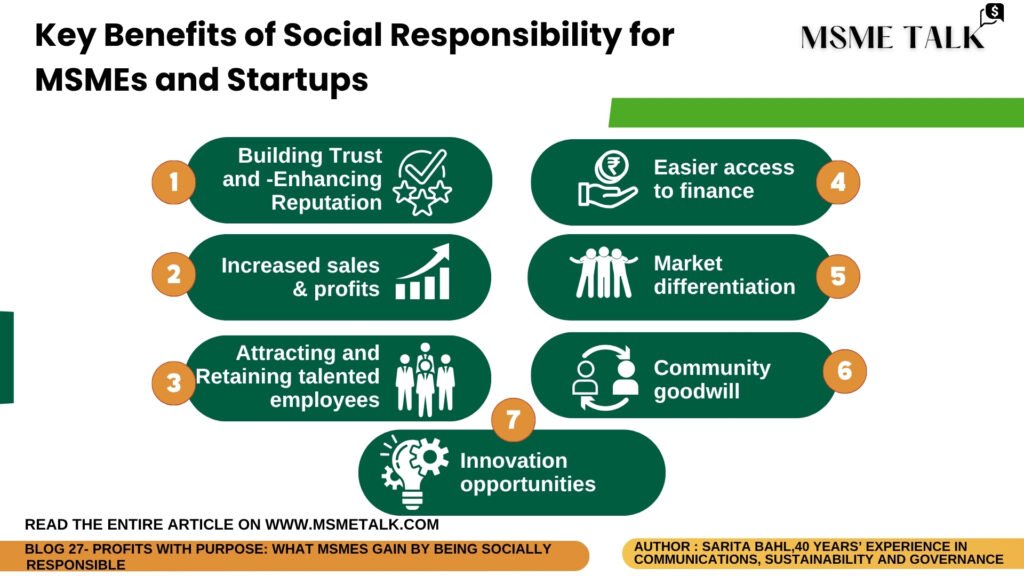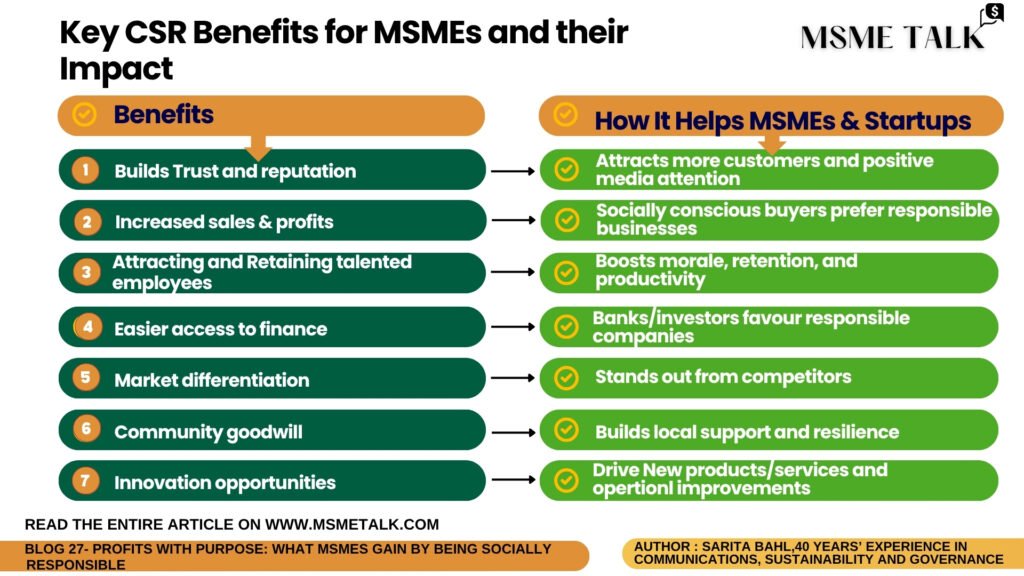Contents
ToggleBLOG 27-Profits with Purpose: What MSMEs Gain by Being Socially Responsible?

In this article, Author who is an independent board director on multiple boards has given her guidance on how social responsibility can benefit India’s MSMEs and startups, where these businesses stand under the country’s CSR law, and the key advantages of adopting responsible practices. You’ll also find real examples of small enterprises creating positive change. Finally, outline steps businesses can take to turn good intentions into lasting impact.
About the Author
Sarita Bahl serves as an independent director on several boards. An alumna of the Tata Institute of Social Sciences and the Swedish Institute of Management Program, she is an accomplished and versatile leader with nearly four decades of experience spanning communications, CSR and sustainability, corporate governance, and policy advocacy.
What is CSR (Corporate Social Responsibility)?
Corporate Social responsibility means a business acts in ways that benefit society, not just its own profits. It’s about being a good neighbour and thinking about how your actions affect people and the planet. This goes beyond just giving money away (which is philanthropy). While philanthropy is about donating to good causes, social responsibility is more about how a business operates every day. It involves making smart choices in your business, like treating employees well, using materials that don’t harm the environment, or helping local communities. These actions are a part of the main business plan.
(Subscribe for alerts to stay updated with new podcast episodes and blogs for MSMEs & Startups)
The MSME landscape in India
India’s Micro, Small, and Medium Enterprises known as MSMEs, are super important for the country’s economy. As of February 2025, there are over 5.93 crore (that’s 59.3 million) MSMEs registered in India, and most of them are very small businesses. These aren’t just numbers; they’re like engines that create growth, new ideas, and jobs.
MSMEs add a lot to India’s economy. Their share in the country’s total economic output (called Gross Value Added or GVA) went up from 27.3% in 2020-21 to 30.1% in 2022-23. They also play a big role in what India sells to other countries, making up almost 46% of India’s total exports in 2024-25. This part of the economy is strong, always changing, and more and more connected to global markets.
Yet, when it comes to Corporate Social Responsibility (CSR) or broader social responsibility, MSMEs often don’t get much attention. Big companies in India have to do Corporate Social Responsibility (CSR) activities by law, but MSMEs and startups don’t.
The CSR law and MSMEs: Where do they stand?
In April 2014, India became the first country to make CSR mandatory through the Companies Act, 2013. This law requires companies meeting any of these thresholds:
✅ Net worth ≥ ₹500 crore
✅ Turnover ≥ ₹1,000 crore
✅ Profit ≥ ₹5 crore
…to spend at least 2% of their average net profits from the past three years on CSR activities.
In the financial year 2023-24, Indian companies spent ₹17,967 crore on CSR, which was a 16% increase from the year before. About 98% of companies that were supposed to do CSR did it, and almost half of them spent more than the required 2%. From 2014 to 2022, the total money spent on CSR reached ₹1.53 lakh crore.
This CSR money mostly goes to things like education, healthcare, protecting the environment, and helping rural areas – these areas get more than 60% of the total spending.
Are MSMEs Legally Required to Spend on CSR if They Earn ₹5 Crore Profit?
Yes, if an SME reaches a profit of ₹5 crore or more, it is legally required to set aside funds for CSR activities under the Companies Act, 2013. However, the CSR mandate under the Companies Act, 2013, applies to Private Limited companies (and other company structures) that meet the specified financial criteria as mentioned above, but it does not extend to Limited Liability Partnerships (LLPs), partnership, Proprietorship , which is how many MSMEs are structured.
Hence, because of mandatory laws, many MSMEs and Startups don’t have social responsibility in their agenda and it goes unreported. As a result, much of the good work that SMEs do—supporting schools, sponsoring local events, helping employees in need—remains informal, undocumented, and outside the scope of strategic CSR. This lack of formal CSR reporting for MSMEs creates a significant blind spot in India’s social development efforts, missing opportunities for both community impact and business benefits like enhanced reputation, access to funding, and customer trust.
(Looking to expand globally? Check out our blog “Introduction to Export-Import Finance” on Export-Import Finance — how it works, types, risks, and best options for MSMEs.)
Benefits for MSMEs and Startups Committed to Social Responsibility
Most MSMEs in India are located in or near towns and villages, where they have both an economic and a social presence. Data from the Ministry of MSME in 2023-24 shows that almost 49% of registered MSMEs are in rural areas, Where they help create jobs, preserve traditional skills, support agriculture, and reduce migration to cities.. Because MSMEs are close to the community’s needs, they are in a great position to make a direct positive impact. But without a clear plan – like setting goals, keeping track, and involving others – these efforts often stay scattered and don’t lead to lasting change.
By organizing their social responsibility efforts strategically, MSMEs can build trust in the community and find new ways to grow. Here are key benefits of adopting CSR for MSMEs and startups:

(Don’t miss MSME TALK special MSME Day 2025 episode of Industry Insights — featuring expert voices from EV, semiconductors, invoice discounting, and circular economy sectors)
Here are some of the key benefits:
Building Trust and -Enhancing Reputation:
Being socially responsible isn’t just about giving back; it’s about earning trust. Customers, employees, and investors increasingly prefer businesses that care about social and environmental responsibility,. For MSMEs and startups, having a reputation for being responsible can make them stand out in busy markets.
Increased sales and Profits:
Socially responsible businesses often see higher customer loyalty and preference, especially from conscious buyers. A positive brand image and values-driven approach can directly influence purchasing decisions, leading to stronger sales and long-term profits
Attracting and Retaining talented employees:
Today’s workers, especially younger ones, want to work for companies that have a purpose beyond just making money. Social initiatives can make employees happier, more loyal, and more productive.
Easier Access to Finance :
Banks and investors are more likely to support businesses that show they are socially responsible. Some government programs are also accessible to suppliers who act responsibly.
Market Differentiation:
In competitive markets, being socially responsible helps MSMEs and startups stand out. Customers and partners increasingly choose businesses that align with their values, giving responsible brands a clear edge over others.
Strengthening Community Support:
MSMEs are often deeply connected to their local communities. By supporting local causes, they strengthen their right to operate and build good relationships that can be very helpful when things get tough.
Driving Innovation and Business Resilience:
Social responsibility can spark new ideas – whether it’s making products that are good for the environment, having better rules for employees, or finding new ways to help the community. It also helps businesses stay strong as rules and markets change.

(Also, Listen to Episode #31-Circular Economy & MSMEs of MSME TALK as Siddharth Lulla breaks down what Circular Economy means for MSMEs — why it matters, what’s changing, and how it can shape your business future)
Some examples of MSMEs doing strategic CSR are:
Sutradhaar Handlooms:
What they did:
Operating from Andhra Pardesh, this small handloom enterprise trained and employed tribal women weavers, improving livelihoods and preserving traditional crafts.
Impact:
Enhanced design quality
Gained media coverage highlighting their women-empowerment model
Attracted funding from social enterprises interested in purpose-driven businesses
Naari Shakti Bakery:
What they did:
A Rajasthan-based social enterprise bakery partnered with a rural women’s self-help group to train and employ local bakers, creating a sustainable income source for women in nearby villages.
Impact:
Built a resilient local brand
Pioneered locally produced baked goods sold in regional markets
Showed that MSMEs can drive social impact with small budgets
Conclusion: The Path Forward
Social responsibility isn’t just a nice-to-have for MSMEs and startups; it’s a smart business move. By Integrating social and environmental values as a core part of their business, small businesses can build trust with customers, attract good employees, gain new customers, and grow steadily.
The best part?You don’t need huge budgets or complicated programs to start.
It just begins with taking small, practical steps aligned with your business.. For MSMEs and startups in India, the chance is clear: by being socially responsible, they not only help society but also secure their own future in an increasingly conscious and competitive market.
(Subscribe MSME TALK for alerts to stay updated with new podcast episodes and blogs by experts for MSMEs & Startups)
This article is authored by Sarita Bahl serves as an independent director on several boards. An alumna of the Tata Institute of Social Sciences and the Swedish Institute of Management Program, she is an accomplished and versatile leader with nearly four decades of experience spanning communications, CSR and sustainability, corporate governance, and policy advocacy.
(Don’t miss MSME TALK special MSME Day 2025 episode of Industry Insights — featuring expert voices from EV, semiconductors, invoice discounting, and circular economy sectors)
